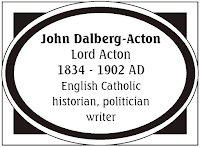“The nation had no instinct and no productive power that emancipated it from the customs of its forefathers. Every appeal against oppression was to the hereditary rights; the only protection which the Englishman knew was in the traditional laws of his country. By means of this perpetual recurrence to old principles, and of the gradual contrivance of new forms in which to secure their action, the English people conquered their freedom. The intensity of their conservatism was an impulse as well as a guide of their progress.'*
------------------------------------------------/
*'Contemporary Literature', The Home and Foreign Review, Vol. III (1863), p. 714
Source: https://en.wikiquote.org/wiki/John_Dalberg-Acton,_1st_Baron_Acton
John Emerich Edward Dalberg-Acton, 1st Baron Acton, 13th Marquess of Groppoli, KCVO, DL (10 January 1834 – 19 June 1902), better known as Lord Acton, was an English Catholic historian, politician, and writer. He was the only son of Sir Ferdinand Dalberg-Acton, 7th Baronet,[1] and a grandson of the Neapolitan admiral and prime minister Sir John Acton, 6th Baronet.[2][3] Between 1837 and 1869 he was known as Sir John Dalberg-Acton, 8th Baronet.
He is perhaps best known for the remark, "Power tends to corrupt, and absolute power corrupts absolutely. Great men are almost always bad men...", which he made in a letter to an Anglican bishop.
https://en.wikipedia.org/wiki/John_Dalberg-Acton,_1st_Baron_Acton
